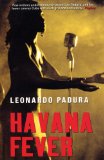Summary | Excerpt | Reviews | Beyond the Book | Readalikes | Genres & Themes | Author Bio

With his bag of books over his shoulder and his stomach gurgling
in joyful anticipation, Mario Conde returned to the reception
room, where the Ferreros awaited him looking grave and anxious.
He only then noticed how the fingers of Amalia, who was at that
moment wiping the sweat from her hands, were atrophied and
sore around the cuticle edges, like frog toes, no doubt because of
her compulsive need to nibble her nails and the skin surrounding
them.
“All right, I’ll take these sixteen books. There’s only one that’s
special, the one on Cuban cooking, though it doesn’t have a high
market value . . . I want it for myself. How about five hundred
pesos for the lot?. . .”
Dionisio looked at his sister and they stared at each other. They
both slowly turned to the Count who rather uneasily anticipated
possible recriminations: ‘You don’t think it’s enough?’
“No,” Dionisio immediately replied. ‘No . . . not at all. I mean,
it’s very fair.’
Conde smiled with relief.
“It’s not very much, but it’s fair. That price includes my earnings,
and the bookseller’s, after he’s paid the space he rents and taxes
. . . You get about thirty per cent of any final price tag. That’s how
we work out the earnings from books that sell easily, a three-way
split.”
“So little?” Amalia couldn’t repress that complaint.
“It’s not so little if you’re convinced I’m not going to swindle
you. I’m a decent fellow and, if we don’t fall out, I will buy lots of
books from you at a good price.” He smiled, assuming he’d dealt
with that quibble, and, before brother and sister could do their
sums differently, he handed over the agreed amount.
When he walked out into the street, he was hit in the face by the
afternoon humidity the sun had whipped up: a short-lived shower
that had stood in for the anticipated storm had merely increased
the mugginess of the air. The Count immediately noticed the
contrast in temperature: the Ferreros’ house, once the property of
the filthy-rich Montes de Ocas, could cope with a Havana summer
and for a moment he felt tempted to go back and take a second look
at the cool mansion, but an intuition warned him against looking
back. If he had, he’d most certainly have been astonished to see a
Ferrero running out of the house to the nearest market, trying to
arrive before five o’clock when they closed the meat, vegetable and
grocery stalls that might spare them for once the obligatory diet of
rice and black beans they shared with several million compatriots.
But as he walked off in search of a road where he might flag
down a passing mini-cab, Mario Conde noted that, although some
symptoms had slackened off, his hunch was still alive and kicking,
clinging to the skin of his left nipple like a bloodthirsty leech.
Yoyi Pigeon, who’d been civically registered and Catholically
baptized with the resonant name of Jorge Reutilio Casamayor
Riquelmes, was twenty-eight years old, slightly swollen-chested
– hence his pigeonnish nickname – and had an irrepressible
propensity for verbal wit. He was moreover a man who thought
on his feet and was quick and efficient at complex calculations, as
endorsed by the academic diploma in civil engineering, framed in
a soberly elegant, wrought bronze frame, that hung on the wall of
his living room in Víbora Park. He was patiently waiting, said the
engineering laureate, for toilet paper to go into short supply so he
could adapt the crackling piece of university parchment to such use,
given it had brought him little success and no economic advantage.
Although the Count was twenty years his senior, he recognized,
with a touch of envy, that Yoyi possessed a cynicism and practical
knowledge of life he had never and clearly would never possess,
even though those qualities were increasingly necessary for survival
in the jungle of Creole life in the third millennium.
Excerpted from Havana Fever by Leonardo Padura Copyright © 2009 by Leonardo Padura. Excerpted by permission of Bitter Lemon Press. All rights reserved. No part of this excerpt may be reproduced or reprinted without permission in writing from the publisher




Show me the books he loves and I shall know the man...
Click Here to find out who said this, as well as discovering other famous literary quotes!
Your guide toexceptional books
BookBrowse seeks out and recommends the best in contemporary fiction and nonfiction—books that not only engage and entertain but also deepen our understanding of ourselves and the world around us.